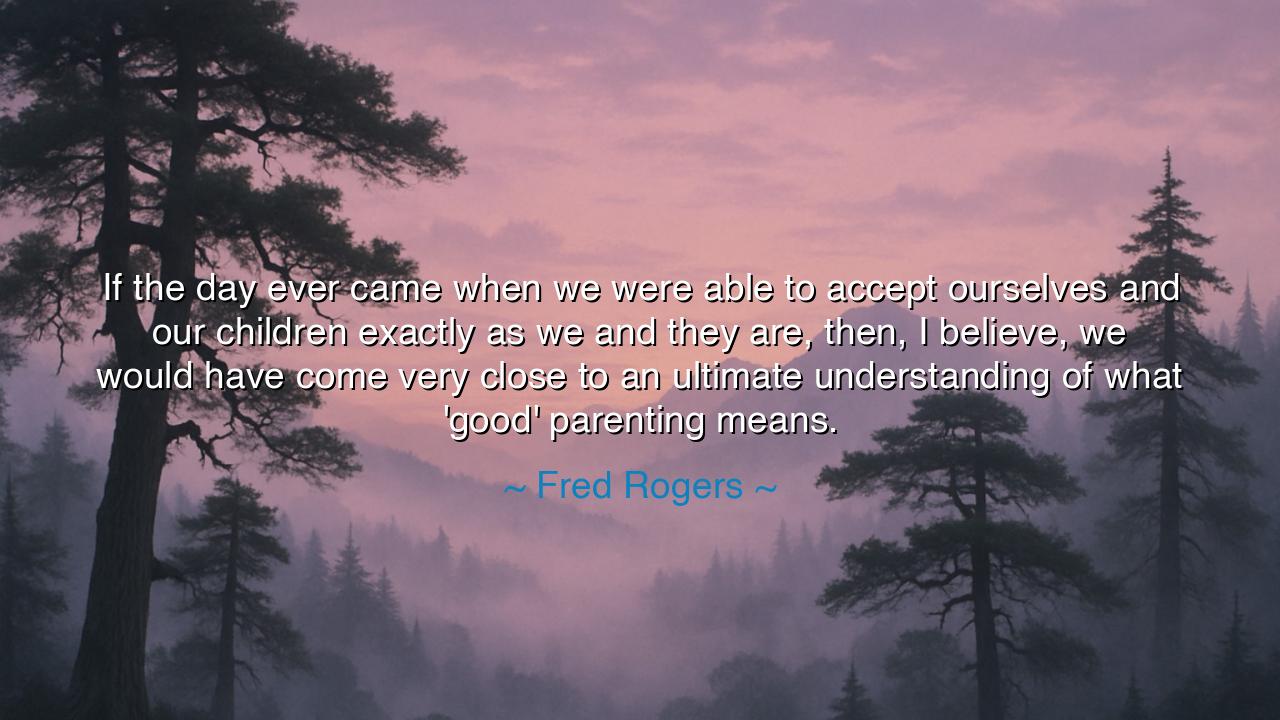
If the day ever came when we were able to accept ourselves and
If the day ever came when we were able to accept ourselves and our children exactly as we and they are, then, I believe, we would have come very close to an ultimate understanding of what 'good' parenting means.






The words of Fred Rogers—“If the day ever came when we were able to accept ourselves and our children exactly as we and they are, then, I believe, we would have come very close to an ultimate understanding of what ‘good’ parenting means.”—shine like a beacon of gentle wisdom. They remind us that the essence of parenting is not in molding children into our imagined image of perfection, but in embracing them as they truly are. Rogers, who dedicated his life to speaking softly but powerfully to the hearts of children, knew that acceptance is the soil in which love takes root and grows. To accept our children—and ourselves—without condition is to draw close to the sacred heart of parenthood.
The ancients often sought to define what it meant to live well, and many believed the key was harmony with nature. The Stoics taught that peace comes from accepting the world as it is, not as we wish it to be. Rogers brings this timeless wisdom into the realm of the family: the child, like the river or the tree, is not to be forced into another shape but to be understood, cherished, and guided according to their nature. When he speaks of acceptance, he calls for an end to the war many parents unconsciously wage against their children’s uniqueness.
History offers us vivid examples of what happens when acceptance is present—and when it is absent. Consider the story of Leopold Mozart, father of Wolfgang Amadeus Mozart. Leopold recognized his son’s extraordinary gift and nurtured it, but he also sought to control and shape him according to his own ambitions. While Wolfgang’s genius could not be extinguished, his life was marked by struggles for independence from his father’s vision. The lesson is clear: without acceptance, even great talent becomes a battleground. In contrast, we find in Anne Sullivan’s devotion to Helen Keller an image of true good parenting. She accepted Helen as she was—not as broken, but as capable—and through patience and love, opened the world to her.
Rogers also points to the truth that self-acceptance is inseparable from acceptance of our children. Many parents project their unhealed wounds, their regrets, or their unfulfilled dreams onto their sons and daughters. They demand excellence not for the child’s sake, but to soothe their own insecurities. Rogers, in his deep compassion, saw that to raise children well, we must first look inward and embrace our own imperfections. Only when we are gentle with ourselves can we truly be gentle with those entrusted to us.
The meaning, then, is both humbling and liberating. Good parenting is not a manual of perfect techniques, nor a relentless climb toward an impossible ideal. It is the daily practice of love without conditions. To accept a child’s laughter and tears, their strengths and weaknesses, their similarities to us and their differences—this is the sacred task. To accept ourselves, flawed yet striving, is the other half of that task. Together, they form the foundation of a home where love is not earned, but given freely.
The lesson for us is clear: practice radical acceptance. This does not mean neglect or permissiveness, for guidance is still required. It means holding a posture of love that does not falter when a child fails, and does not vanish when they disappoint. It means telling ourselves: “I am enough, even in my imperfection,” so that we can say to our children: “You are enough, exactly as you are.” In that exchange, the generations are healed.
Therefore, let your actions be these: speak words of unconditional love daily. Release the grip of impossible expectations. Listen to your children with patience, not to correct them into your image, but to understand their own. And treat yourself with the same kindness, for your children will learn how to treat themselves by watching how you treat yourself.
Thus, Fred Rogers’ gentle proclamation stands as a profound truth: to accept ourselves and our children as we are is the closest we can come to the ideal of good parenting. It is not perfection, but presence. Not control, but compassion. Not demand, but devotion. Let this wisdom be passed down to all who raise the young: that the truest home is not built of bricks or wealth, but of acceptance, where love flows freely, unearned, eternal.






AAdministratorAdministrator
Welcome, honored guests. Please leave a comment, we will respond soon